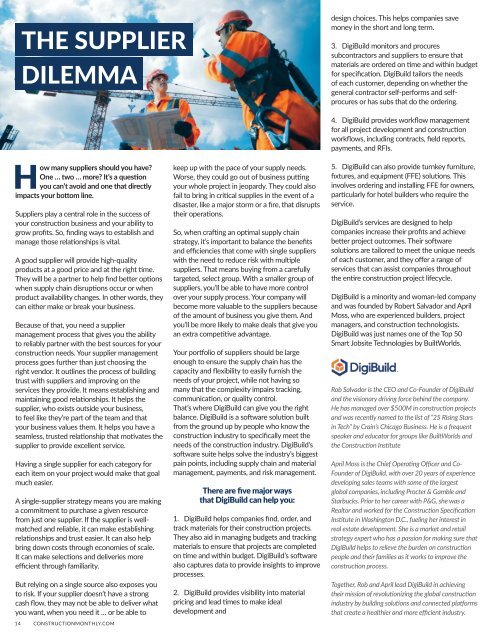Construction Monthly Magazine | Tampa 2023 Build Expo Show Edition
Create successful ePaper yourself
Turn your PDF publications into a flip-book with our unique Google optimized e-Paper software.
THE SUPPLIER<br />
DILEMMA<br />
design choices. This helps companies save<br />
money in the short and long term.<br />
3. Digi<strong>Build</strong> monitors and procures<br />
subcontractors and suppliers to ensure that<br />
materials are ordered on time and within budget<br />
for specification. Digi<strong>Build</strong> tailors the needs<br />
of each customer, depending on whether the<br />
general contractor self-performs and selfprocures<br />
or has subs that do the ordering.<br />
4. Digi<strong>Build</strong> provides workflow management<br />
for all project development and construction<br />
workflows, including contracts, field reports,<br />
payments, and RFIs.<br />
How many suppliers should you have?<br />
One … two … more? It’s a question<br />
you can’t avoid and one that directly<br />
impacts your bottom line.<br />
Suppliers play a central role in the success of<br />
your construction business and your ability to<br />
grow profits. So, finding ways to establish and<br />
manage those relationships is vital.<br />
A good supplier will provide high-quality<br />
products at a good price and at the right time.<br />
They will be a partner to help find better options<br />
when supply chain disruptions occur or when<br />
product availability changes. In other words, they<br />
can either make or break your business.<br />
Because of that, you need a supplier<br />
management process that gives you the ability<br />
to reliably partner with the best sources for your<br />
construction needs. Your supplier management<br />
process goes further than just choosing the<br />
right vendor. It outlines the process of building<br />
trust with suppliers and improving on the<br />
services they provide. It means establishing and<br />
maintaining good relationships. It helps the<br />
supplier, who exists outside your business,<br />
to feel like they’re part of the team and that<br />
your business values them. It helps you have a<br />
seamless, trusted relationship that motivates the<br />
supplier to provide excellent service.<br />
Having a single supplier for each category for<br />
each item on your project would make that goal<br />
much easier.<br />
A single-supplier strategy means you are making<br />
a commitment to purchase a given resource<br />
from just one supplier. If the supplier is wellmatched<br />
and reliable, it can make establishing<br />
relationships and trust easier. It can also help<br />
bring down costs through economies of scale.<br />
It can make selections and deliveries more<br />
efficient through familiarity.<br />
But relying on a single source also exposes you<br />
to risk. If your supplier doesn’t have a strong<br />
cash flow, they may not be able to deliver what<br />
you want, when you need it … or be able to<br />
14 CONSTRUCTIONMONTHLY.COM<br />
keep up with the pace of your supply needs.<br />
Worse, they could go out of business putting<br />
your whole project in jeopardy. They could also<br />
fail to bring in critical supplies in the event of a<br />
disaster, like a major storm or a fire, that disrupts<br />
their operations.<br />
So, when crafting an optimal supply chain<br />
strategy, it’s important to balance the benefits<br />
and efficiencies that come with single suppliers<br />
with the need to reduce risk with multiple<br />
suppliers. That means buying from a carefully<br />
targeted, select group. With a smaller group of<br />
suppliers, you’ll be able to have more control<br />
over your supply process. Your company will<br />
become more valuable to the suppliers because<br />
of the amount of business you give them. And<br />
you’ll be more likely to make deals that give you<br />
an extra competitive advantage.<br />
Your portfolio of suppliers should be large<br />
enough to ensure the supply chain has the<br />
capacity and flexibility to easily furnish the<br />
needs of your project, while not having so<br />
many that the complexity impairs tracking,<br />
communication, or quality control.<br />
That’s where Digi<strong>Build</strong> can give you the right<br />
balance. Digi<strong>Build</strong> is a software solution built<br />
from the ground up by people who know the<br />
construction industry to specifically meet the<br />
needs of the construction industry. Digi<strong>Build</strong>’s<br />
software suite helps solve the industry’s biggest<br />
pain points, including supply chain and material<br />
management, payments, and risk management.<br />
There are five major ways<br />
that Digi<strong>Build</strong> can help you:<br />
1. Digi<strong>Build</strong> helps companies find, order, and<br />
track materials for their construction projects.<br />
They also aid in managing budgets and tracking<br />
materials to ensure that projects are completed<br />
on time and within budget. Digi<strong>Build</strong>’s software<br />
also captures data to provide insights to improve<br />
processes.<br />
2. Digi<strong>Build</strong> provides visibility into material<br />
pricing and lead times to make ideal<br />
development and<br />
5. Digi<strong>Build</strong> can also provide turnkey furniture,<br />
fixtures, and equipment (FFE) solutions. This<br />
involves ordering and installing FFE for owners,<br />
particularly for hotel builders who require the<br />
service.<br />
Digi<strong>Build</strong>’s services are designed to help<br />
companies increase their profits and achieve<br />
better project outcomes. Their software<br />
solutions are tailored to meet the unique needs<br />
of each customer, and they offer a range of<br />
services that can assist companies throughout<br />
the entire construction project lifecycle.<br />
Digi<strong>Build</strong> is a minority and woman-led company<br />
and was founded by Robert Salvador and April<br />
Moss, who are experienced builders, project<br />
managers, and construction technologists.<br />
Digi<strong>Build</strong> was just names one of the Top 50<br />
Smart Jobsite Technologies by BuiltWorlds.<br />
Rob Salvador is the CEO and Co-Founder of Digi<strong>Build</strong><br />
and the visionary driving force behind the company.<br />
He has managed over $500M in construction projects<br />
and was recently named to the list of “25 Rising Stars<br />
in Tech” by Crain’s Chicago Business. He is a frequent<br />
speaker and educator for groups like BuiltWorlds and<br />
the <strong>Construction</strong> Institute<br />
April Moss is the Chief Operating Officer and Co-<br />
Founder of Digi<strong>Build</strong>, with over 20 years of experience<br />
developing sales teams with some of the largest<br />
global companies, including Procter & Gamble and<br />
Starbucks. Prior to her career with P&G, she was a<br />
Realtor and worked for the <strong>Construction</strong> Specification<br />
Institute in Washington D.C., fueling her interest in<br />
real estate development. She is a market and retail<br />
strategy expert who has a passion for making sure that<br />
Digi<strong>Build</strong> helps to relieve the burden on construction<br />
people and their families as it works to improve the<br />
construction process.<br />
Together, Rob and April lead Digi<strong>Build</strong> in achieving<br />
their mission of revolutionizing the global construction<br />
industry by building solutions and connected platforms<br />
that create a healthier and more efficient industry.
















